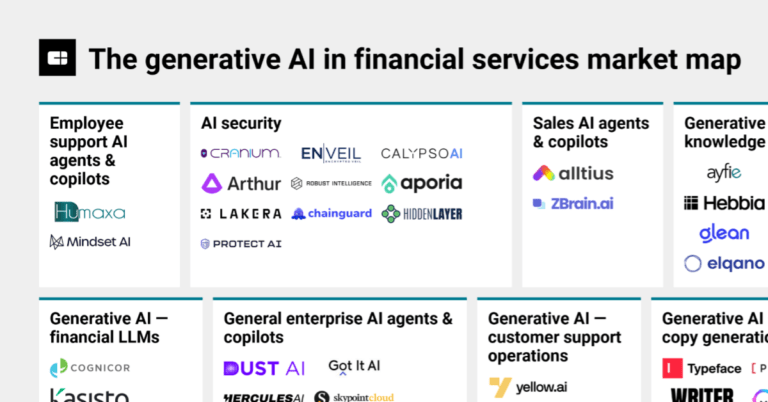
Dust
Founded Year
2022Stage
Series A | AliveTotal Raised
$21.46MLast Raised
$16M | 1 yr agoRevenue
$0000Mosaic Score The Mosaic Score is an algorithm that measures the overall financial health and market potential of private companies.
+195 points in the past 30 days
About Dust
Dust develops generative AI-based software to build workflows on top of large language models and semantic search. The platform offers a range of training and support resources, scales to meet the needs, and helps secure compliance with industry standards. The company was founded in 2022 and is based in Paris, France.
Loading...
ESPs containing Dust
The ESP matrix leverages data and analyst insight to identify and rank leading companies in a given technology landscape.
The AI agent builder platforms market offers no-code and low-code solutions for business users to create and deploy AI agents without programming expertise. These platforms provide drag-and-drop interfaces, pre-built templates, and visual workflow builders for automating tasks like customer support, scheduling, and lead qualification. Key features include integrations with business tools, multi-ch…
Dust named as Challenger among 15 other companies, including Zapier, Salesforce, and WRITER.
Loading...
Research containing Dust
Get data-driven expert analysis from the CB Insights Intelligence Unit.
CB Insights Intelligence Analysts have mentioned Dust in 7 CB Insights research briefs, most recently on Oct 20, 2025.

Oct 20, 2025 report
Book of Scouting Reports: 2025’s Digital Health 50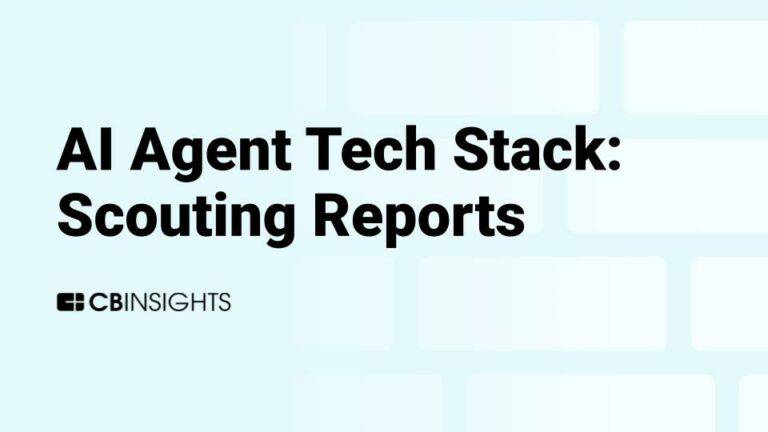
Sep 5, 2025 report
Book of Scouting Reports: The AI Agent Tech Stack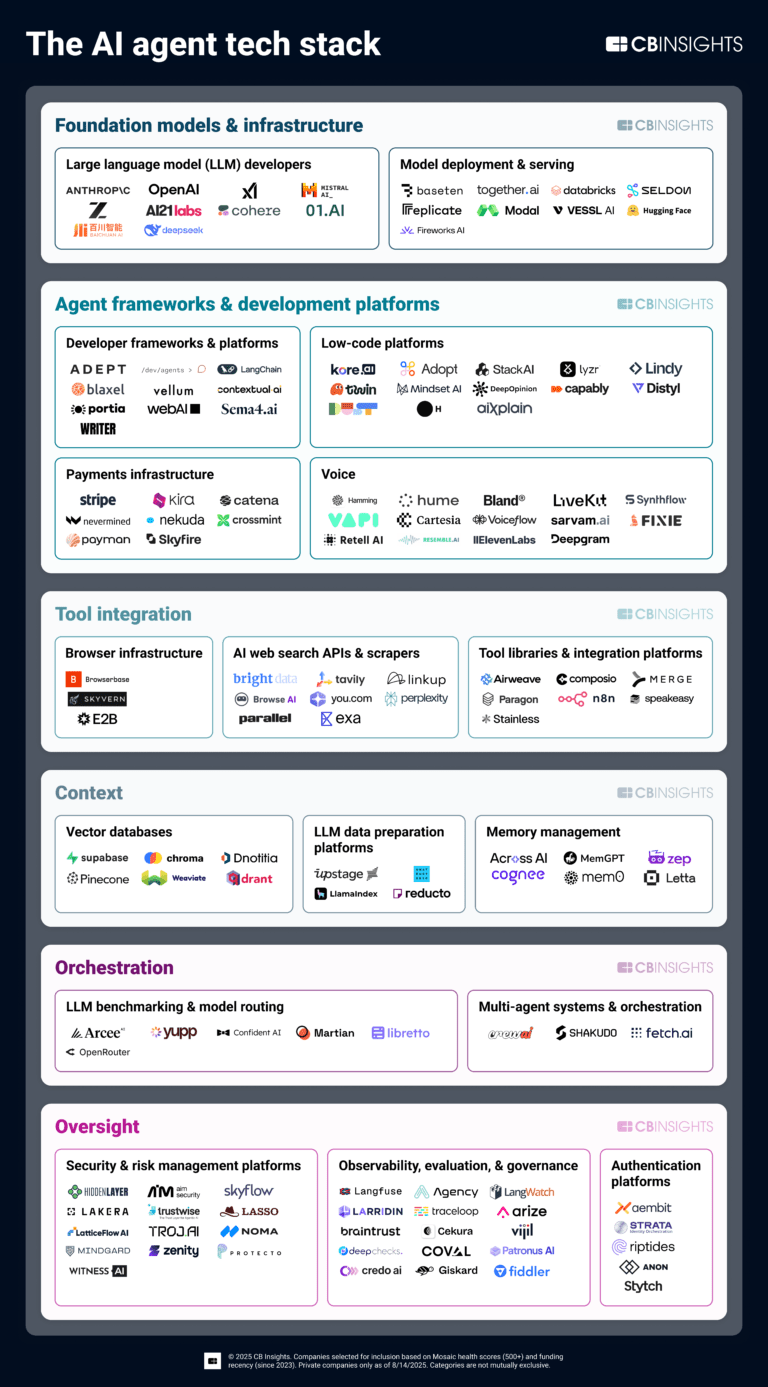
Aug 22, 2025
The AI agent tech stack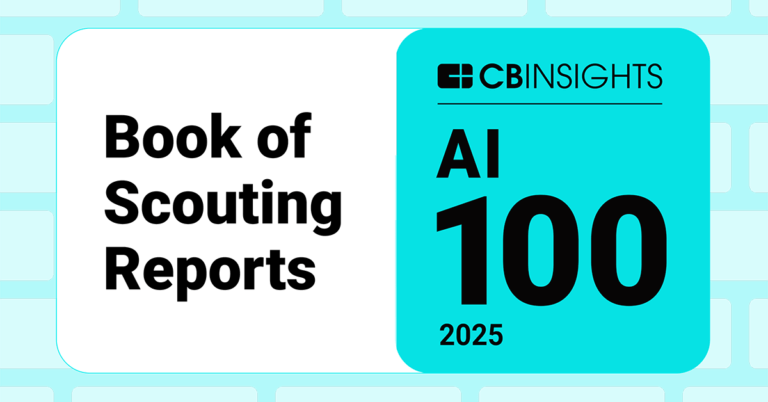
May 16, 2025 report
Book of Scouting Reports: 2025’s AI 100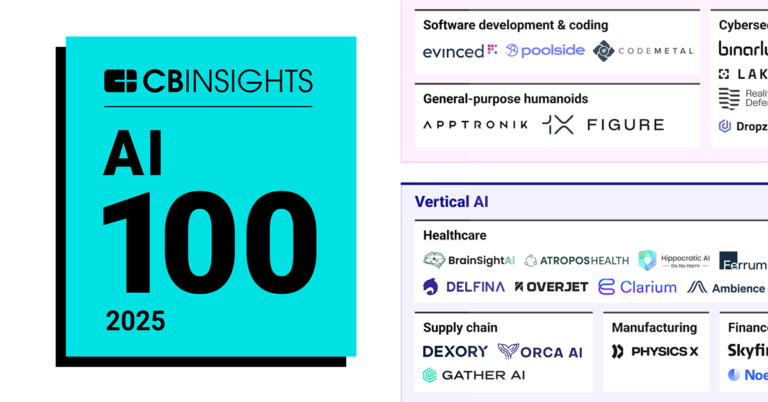
Apr 24, 2025 report
AI 100: The most promising artificial intelligence startups of 2025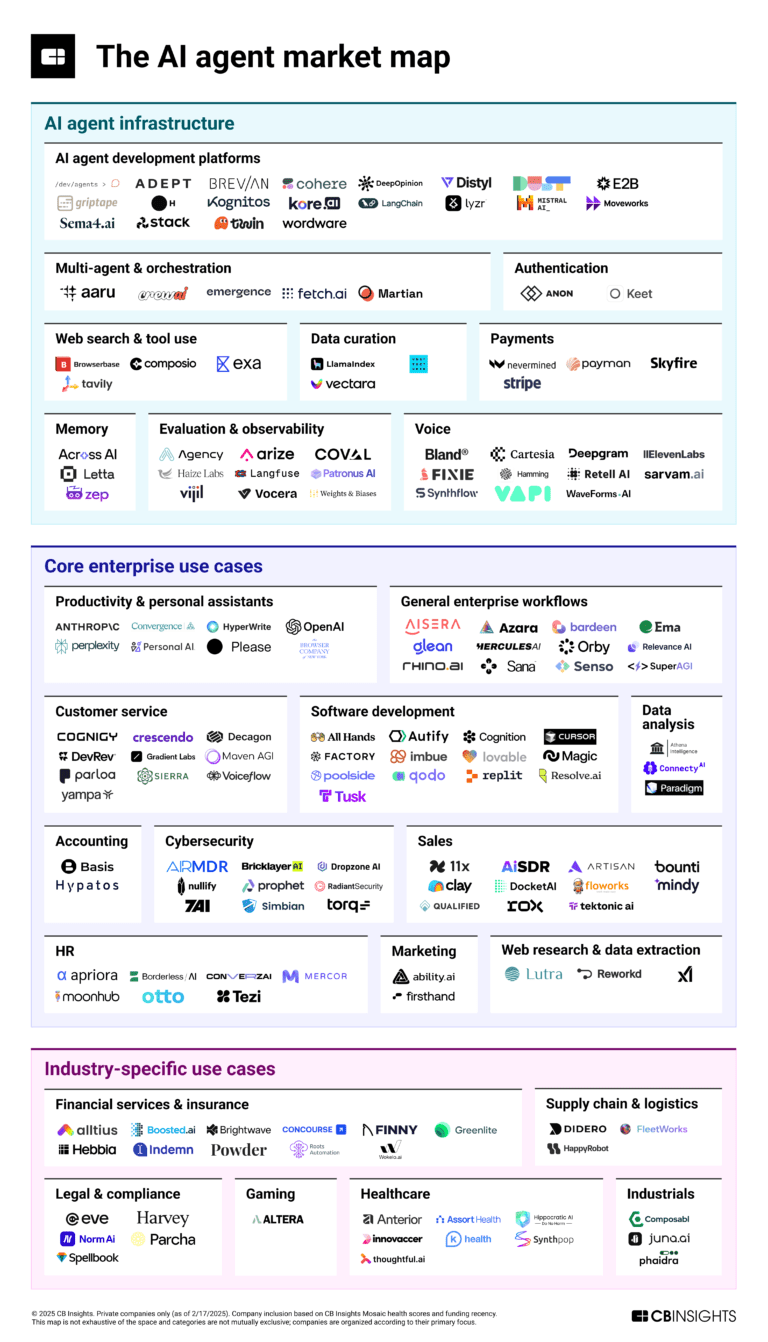
Mar 6, 2025
The AI agent market map: March 2025 editionExpert Collections containing Dust
Expert Collections are analyst-curated lists that highlight the companies you need to know in the most important technology spaces.
Dust is included in 6 Expert Collections, including Generative AI.
Generative AI
2,951 items
Companies working on generative AI applications and infrastructure.
Artificial Intelligence (AI)
14,182 items
Companies developing artificial intelligence solutions, including cross-industry applications, industry-specific products, and AI infrastructure solutions.
AI agents (March 2025)
376 items
Companies developing AI agent applications and agent-specific infrastructure. Includes pure-play emerging agent startups as well as companies building agent offerings with varying levels of autonomy. Not exhaustive.
AI 100 (2025)
100 items
AI agents & copilots
1,772 items
Companies developing AI agents, assistants/copilots, and agentic infrastructure. Includes pure-play emerging agent startups as well as companies building agent offerings with varying levels of autonomy.
AI 100 (All Winners 2018-2025)
100 items
Latest Dust News
Nov 8, 2025
Why Dust Matters Right Now If you’re running a B2B SaaS company in 2025 and haven’t figured out your AI agent strategy yet, you’re already behind. Not “a little behind” – like seriously behind. Because while everyone’s been debating whether AI agents are real or hype, companies like Clay, Qonto, Doctolib, and Alan have been quietly using Dust to achieve 70%+ weekly AI adoption rates across thousands of employees. That’s not a typo. 70% weekly usage across 3,000+ person organizations. Let me tell you about the most interesting AI infrastructure play you might not know about yet. The Dust Story: OpenAI Researcher Meets Stripe PM Dust was founded in February 2023 by two second-time founders who knew each other from their first startup (TOTEMS, a data analytics company acquired by Stripe in 2015). The founding duo is fascinating: Stanislas Polu spent three years at OpenAI’s research team studying mathematical reasoning in language models. Before that, he was at Stripe as a software engineer. He’s École Polytechnique + Stanford pedigreed, and he literally watched GPT-2 write its first coherent paragraph at OpenAI. That “oh shit” moment convinced him that LLMs would fundamentally reshape enterprise software. Gabriel Hubert went from Stripe (where he drove geographical expansion and product) to Chief Product Officer at Alan, one of Europe’s fastest-growing insurtech companies. He’s also École Polytechnique + Stanford, and he’s the product thinker to Stan’s AI researcher brain. They raised €5M in seed from Sequoia Capital in 2023, then came back in June 2024 with another $16M Series A – also led by Sequoia – at what sources suggest was around a $100M+ valuation. Total raised: $21.5M. The team is only 66 people and they hit $7.3M ARR as of mid-2025. That’s over $110K ARR per employee – which is exceptional for this early stage. They’re Paris-based but increasingly global. What Dust Actually Does (And Why It’s Different) Here’s what makes Dust different from the 10,000 other “AI assistant” companies flooding your LinkedIn: 1. Multi-Agent, Not Single-Assistant Philosophy Most AI tools give you one big dumb assistant that tries to do everything poorly. Dust’s core insight? A team of specialized agents beats one generalist assistant every single time. You can spin up agents for: Customer support (reads your Zendesk tickets, help docs, past conversations) Sales enablement (connected to your CRM, competitive intel, call transcripts) Engineering documentation (pulls from GitHub, Notion, Linear, past PRs) Data analysis (queries your databases, generates visualizations) Content creation (understands your brand voice, past campaigns, style guides) Each agent is narrow, specific, and actually good at its job. Because it’s pulling from the exact data sources it needs and nothing else. 2. Model Agnostic (This Is Huge) Dust doesn’t bet on one AI model winning. They integrate: GPT-4 and o1 from OpenAI Claude 3.5 Sonnet and Opus from Anthropic Gemini from Google Mistral models You pick the right model for each task. Some queries need Claude’s reasoning. Some need GPT-4’s speed. Some need Gemini’s multimodal capabilities. Dust handles the orchestration. This is strategically brilliant. When OpenAI has a latency spike at 9am PST (which you can literally time by the API slowdowns), your team isn’t dead in the water. When Anthropic releases a better model, you can switch instantly. 3. Actual Enterprise-Grade Data Connectivity Dust connects to everything your company actually uses: Google Drive, Notion, Confluence (knowledge bases) Slack, Microsoft Teams (conversations) Zendesk, Intercom (support) And they just shipped Model Context Protocol (MCP) support for custom integrations But here’s the critical part: granular permissions. Your engineering docs don’t leak to sales. Your financial models don’t leak to marketing. Dust respects your existing access controls and enforces them in the AI layer. SOC 2 Type II certified. GDPR compliant. HIPAA-compatible. Zero data retention option. US/EU data residency. SSO and SCIM for enterprise. This isn’t “AI washed” security theater. This is actual enterprise-grade infrastructure. 4. No-Code Agent Builder (The “Vibe Coding” of AI) Here’s where it gets really interesting. Anyone on your team can build an agent in literally minutes: Name your agent and describe what it should do Connect the data sources it needs access to Give it specific instructions and constraints Deploy it to your workspace or specific teams Done I’m talking 5 minutes from idea to deployed agent. No coding. No prompt engineering PhD required. No waiting for IT. Want an agent that reads all your customer feedback from Zendesk, Gong calls, and Slack, then generates a weekly synthesis? Build it. Want an agent that monitors your competitors’ documentation and blogs for changes? Build it. Want an agent that helps new hires understand your codebase by answering questions from your GitHub repos and internal docs? Build it. The “democratization” of AI agent creation is real here, and it’s powerful. The Metrics That Actually Matter Let’s talk cold hard numbers, because that’s what we care about at SaaStr: Adoption Metrics (These Are Insane) Doctolib: 70% weekly usage across 3,000 employees Qonto: 75% monthly usage (targeting 100% by year-end) Clay: 100% adoption rate while scaling 4x Average customer retention: stickiness comparable to Slack (per Sequoia) Think about that. Slack is the gold standard for “everyone in the company uses it daily.” Dust is achieving similar stickiness for AI agents. That’s the signal. Customer Impact (Revenue Per Employee Stuff) Malt: Cut support ticket closing time by 50% Qonto: Saving 50,000 hours annually (that’s 24 FTEs at 2080 hours/year) Alan: Engineers reporting 20% faster project completion Pennylane: Agent evolved from support tool to operational backbone These aren’t “we saved 10 minutes per day” vanity metrics. These are “we’re running a materially different business because of this tool” transformations. Business Model & Pricing Pro: €29/user/month (~$32 USD) They also offer programmatic usage pricing (API, Google Sheets, Zapier) for automation use cases. At $32/month per seat, if you get 70% of your company actually using it weekly, the ROI is obvious. You’re replacing or dramatically reducing spend on: Point solution AI tools ($20-40/user/month each) Consultant time building custom agents Engineering resources maintaining homegrown solutions The opportunity cost of slow AI adoption Why This Matters for Your B2B Business I spend a lot of time thinking about AI deployment in B2B. Here’s what Dust gets right that most companies miss: 1. They Solved the “Which Model?” Problem Every SaaS founder I talk to asks: “Should we build on OpenAI? Anthropic? Host our own?” Dust’s answer: “All of them, and let the use case decide.” This is so smart. You’re not betting your product roadmap on one vendor. You’re not rewriting everything when a better model drops. You’re infrastructure-agnostic from day one. 2. They Made AI Agents Actually Useful (Not Just Chatbots) Most “AI assistants” are just chat interfaces that hallucinate answers. Dust agents can: Search across your actual company data (not just chat history) Execute actions in other tools (create tickets, update CRM, post to Slack) Chain multiple operations together (research → analyze → summarize → post) Run on schedules (daily reports, weekly summaries, monthly reviews) This is the difference between a chatbot and actual software. Dust agents are software. 3. They Nailed the Bottleneck The bottleneck for AI adoption in enterprises isn’t AI capability. It’s: Security/compliance concerns (solved: SOC 2, GDPR, access controls) Integration complexity (solved: native connectors, MCP) User adoption (solved: anyone can build agents, no-code) ROI measurement (solved: clear productivity gains, measurable outcomes) Dust systematically attacked each of these. That’s why they’re seeing 70%+ adoption while most enterprise AI tools sit at 10-20%. 4. The Platform Play Is Real Dust isn’t selling you 10 different AI products. They’re selling you one platform that replaces 10 products. Your copilot for coding? Dust agent connected to GitHub. Your sales assistant? Dust agent connected to Salesforce and Gong. Your customer support AI? Dust agent connected to Zendesk and your help docs. One vendor. One security review. One contract. One invoice. One admin panel. CFOs and CIOs love this. Probably more than they should admit. The Competitive Landscape Direct Competitors: You have tribal knowledge scattered across 5+ tools Your team already uses AI tools, but inconsistently You care about data security (regulated industry) You want to build custom AI workflows, not buy 10 point solutions You have a distributed team that needs async knowledge access Red Flags (Not a Fit): You’re pre-product-market fit (too early) You don’t have meaningful data in connected tools yet You want an out-of-the-box solution with zero customization Your team is extremely change-resistant The Bottom Line: Should You Care About Dust? If you’re a B2B founder/executive: Yes, you should 100% try Dust. Even if you don’t buy it, you need to understand what best-in-class AI deployment looks like. The companies using it are achieving 4x productivity gains on specific workflows. That’s not hype, that’s measurable ROI. If you’re a VC: This is a real business with real metrics. $7.3M ARR on $21.5M raised with 66 people is capital efficient. 70% weekly adoption rates suggest genuine product-market fit, not just pilot purgatory. Sequoia clearly sees it (they led both rounds). If you’re building an AI product: Study what Dust did right: Model agnostic from day one Enterprise security wasn’t an afterthought They made agent building accessible, not just usable They picked a wedge (knowledge workers in 100-1000 person companies) and dominated it If you’re a customer: Try it. The ROI case is pretty simple: $32/user/month Data is chunked and embedded (vector representations) Embeddings are stored with access control metadata When a query comes in, relevant chunks are retrieved Context + query goes to appropriate LLM Response is formatted and returned Key Technical Choices: Vector search for retrieval (not just keyword search) Stateful conversations (context persists across messages) Action execution (can call APIs, not just chat) Scheduled jobs (agents run on timers, not just on-demand) This is all stuff you could build yourself… but it’s 12-18 months of engineering work and ongoing maintenance. Or you pay $32/user/month and it just works. Meet Dust in Person Want to see Dust in action? They’ll be at SaaStr AI London on December 1-2, where you can meet the team and get a hands-on demo. This is your chance to: See real customer workflows, not demo-ware Ask tough questions about security and compliance Understand how agents actually get built and deployed Meet Stan and Gabe (the founders are actually technical and can go deep) Talk to other companies using Dust about their experience If you’re serious about AI deployment in your company, this is worth the trip. Final Thoughts There are a million AI tools launching every week. Most are just ChatGPT wrappers with a fancy UI. Many will be dead in 18 months. Dust is different because: Thoughtful technical architecture – model agnostic, security-first Strong founding team – OpenAI researcher + Stripe/Alan product leader Actual customer ROI – 50% support time reduction, 20% faster projects Capital efficient growth – $7.3M ARR on $21.5M raised This is a real company building real infrastructure for how AI gets deployed in enterprises. Not everyone needs it. But if you’re a 100-1000 person knowledge work business trying to figure out your AI strategy, Dust should absolutely be on your shortlist. The companies using it are moving faster than their competitors. And in B2B, velocity compounds. Want to go deeper on AI deployment strategies? Come to SaaStr AI London on Dec 1-2 and let’s talk. And swing by the Dust booth while you’re there. SaaStr AI App of the Week is a weekly series highlighting the most interesting AI tools actually being used in production by B2B companies. Not just demos. Not just pilots. Actually deployed, actually working, actually generating ROI. Related Posts
Dust Frequently Asked Questions (FAQ)
When was Dust founded?
Dust was founded in 2022.
Where is Dust's headquarters?
Dust's headquarters is located at 86 Avenue Wagram, Paris.
What is Dust's latest funding round?
Dust's latest funding round is Series A.
How much did Dust raise?
Dust raised a total of $21.46M.
Who are the investors of Dust?
Investors of Dust include XYZ Ventures, Motier Ventures, GG1, Sequoia Capital, Seedcamp and 9 more.
Who are Dust's competitors?
Competitors of Dust include Stack AI and 1 more.
Loading...
Compare Dust to Competitors

Qdrant focuses on providing vector similarity search technology, operating in the artificial intelligence and database sectors. The company offers a vector database and vector search engine, which deploys as an API service to provide a search for the nearest high-dimensional vectors. Its technology allows embeddings or neural network encoders to be turned into applications for matching, searching, recommending, and more. Qdrant primarily serves the artificial intelligence applications industry. It was founded in 2021 and is based in Berlin, Germany.

Glean serves as an enterprise artificial intelligence (AI) platform that provides tools for workplace productivity across various sectors. Its main offerings include AI-assisted search, custom generative AI applications, and management of AI agents. The platform is used by departments such as engineering, customer service, sales, and human resources, in industries including retail and financial services. It was founded in 2019 and is based in Palo Alto, California.

n8n serves as a workflow automation platform that integrates artificial intelligence (AI) capabilities with business process automation in the technology sector. The platform includes a visual builder for creating workflows, the ability to integrate with various applications or application program interfaces (APIs), and allows coding in Javascript and Python for specific tasks. n8n is used by technical teams in sectors like information technology (IT) operations, security operations, and sales automation. It was founded in 2019 and is based in Berlin, Germany.

Boomi is a provider of integration platform as a service (iPaaS) solutions focused on connectivity and automation across various business sectors. It offers services including API management, workflow automation, and data synchronization to integrate applications and data. Its platform is designed to cater to the needs of industries such as manufacturing, healthcare, retail, financial services, and education, among others. It was founded in 2000 and is based in Conshohocken, Pennsylvania.
Tiledesk provides customer service automation solutions that utilize artificial intelligence technology within various business sectors. The company offers tools for creating and deploying AI agents that assist in customer interactions and support internal workflows across different channels. It platform serves the e-commerce, healthcare, financial services, telecom, tourism, manufacturing, education, and professional services industries. The company was founded in 2020 and is based in Soleto, Italy.

Dynamiq provides a platform for developing, deploying, and monitoring generative AI (GenAI) applications across various sectors. The company offers tools for prototyping, testing, deployment, observability, and model fine-tuning, which operate within the client's infrastructure. The platform is applicable to industries such as financial services, healthcare, and the public sector, with a focus on security, compliance, and AI application lifecycle management. It was founded in 2024 and is based in Dover, Delaware.
Loading...

